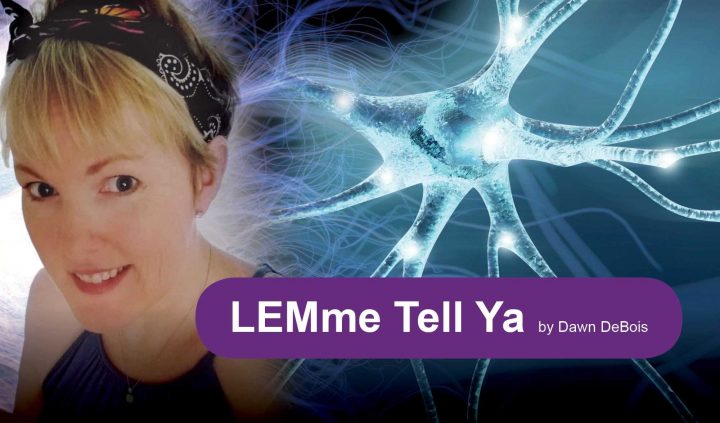My Mental Health Safety Net
Written by |

In my last column, I shared wording that I’ve used to explain Lambert-Eaton myasthenic syndrome (LEMS) to my family, friends, and medical providers. However, I feel that I would be doing the LEMS, rare disease, and chronic illness communities a disservice if I didn’t admit that, at times, always needing to explain your ultra-rare, invisible illness is an incredibly difficult burden to carry.
The National Institute of Mental Health recognizes that depression is common among people with chronic illnesses. I have depression. Some days I suffer from it, but most days, I manage my depression, just like I do with LEMS.
The constant need to justify your reality to those who cannot see it adds a weight to shoulders that are already burdened with concerns about managing your disease. Sometimes, it feels overwhelming. In many cases, careers are lost, friendships disappear, finances become a constant struggle, and romantic relationships fall apart under the challenges of our illness.
Readers often reach out to me saying, “You are so strong.” I’ll admit to having been blessed with resilience, but I don’t walk this tightrope alone. Aside from my strong faith, I have a wonderful therapist whom I have come to regard as my mental health safety net when things start to become overwhelming.
I first interviewed my current therapist, Jon, during my first year of being officially disabled. The first question I asked him was, “Do you have experience with chronically ill patients whose lives have been changed drastically by their illness?” My second question was, “Will you please challenge my train of thought?”
Previously, I’d had a few sessions with a counselor who not only nodded off, but only listened and never questioned my thought process. I knew I needed more. I wanted to make sure that, when my thoughts were circling in unproductive ways, someone would help me turn them in a positive direction. Thankfully, Jon’s methodology matched my needs exactly.
For a while, I was stuck looking back at what being undiagnosed for so long had taken away from my children, my marriage, and my career. To me, that is truly what depression is: looking backward and dwelling on what might have been.
Being diagnosed with a rare disease is tough. The tests you undergo to make sure there is nothing else major, like cancer, behind the rare disease are tougher. Then you have flares when you least expect them, which disrupts everything in your life. It can be overwhelming. I’m on a low, fixed monthly income, so shopping is no longer my go-to activity when I’m feeling stressed. Alcohol and cigarettes have never served that purpose for me, and I would never recommend them. Jon became my go-to option when I felt overwhelmed by the unending medical and life complexities being thrown my way.
A trained therapist truly helps you to look forward after processing the past and putting it where it belongs. They also help you to recognize healthy coping mechanisms: new hobbies, stress relievers, and outlets that you may have thought of, but never pursued. Anyone who finds benefit in my writing can thank Jon. I encourage everyone to find someone like him.
About a year into my therapy, Jon told me that if I had better plans for when we had an appointment, I should feel free to cancel and go do that instead. He said he could always use that time to do paperwork. I still schedule an appointment with him about once a month. Most of the time, we talk about my writing plans or what’s going on with my grown sons, but knowing that I have a professional therapist who understands my rare disease is my mental health safety net.
I watch Michael Phelps talk about his depression and anxiety in his commercials for TalkSpace, and I feel a sense of camaraderie. I spent most of my childhood in the pool, just like he did. When he says, “The black line at the bottom of the pool never talks back,” it brings my mind back to so many one-sided conversations I had growing up. The journey as a rare disease patient is lonely enough. Finding a professional therapist you trust, who can help you relieve the burden when it feels too heavy, is nothing to be ashamed of.
***
Note: Lambert-Eaton News is strictly a news and information website about the disease. It does not provide medical advice, diagnosis, or treatment. This content is not intended to be a substitute for professional medical advice, diagnosis, or treatment. Always seek the advice of your physician or other qualified health provider with any questions you may have regarding a medical condition. Never disregard professional medical advice or delay in seeking it because of something you have read on this website. The opinions expressed in this column are not those of Lambert-Eaton News or its parent company, Bionews Services, and are intended to spark discussion about issues pertaining to Lambert-Eaton myasthenia.





Smith
Readers often reach out to me saying, “You are so strong.” I’ll admit to having been blessed with resilience, but I don’t walk this tightrope alone. Aside from my strong faith, I have a wonderful therapist whom I have come to regard as my mental health safety net when things start to become overwhelming.